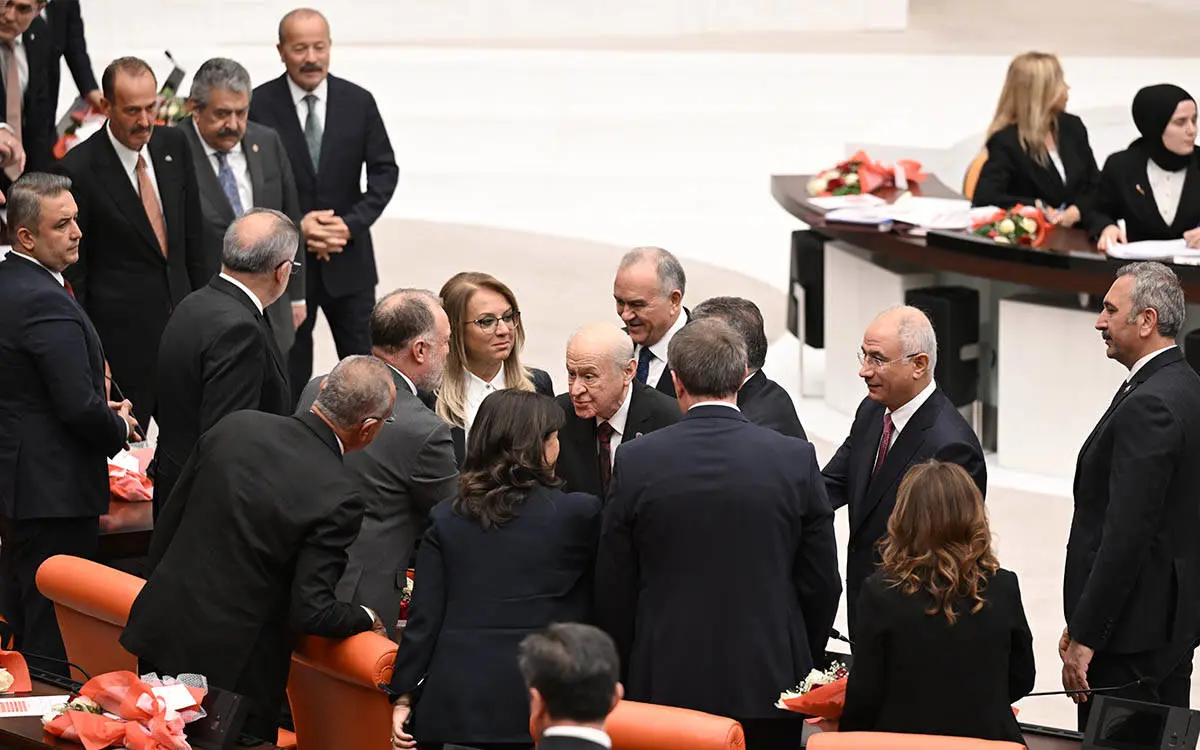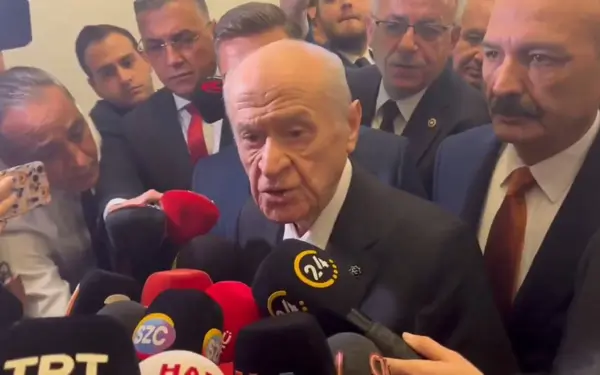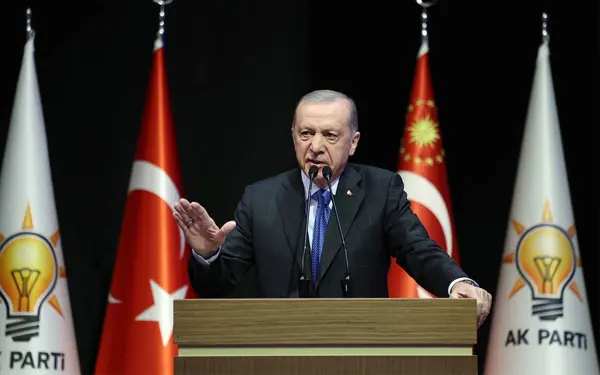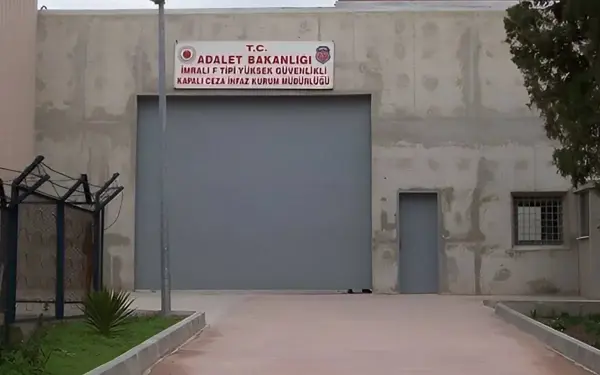An ‘event’ and afterwards: The handshake between Bahçeli and DEM deputies


The race to convey moderate messages with the opening of the parliamentary session, the handshakes in the general assembly, and mutual praise and sincere statements during the reception held at the same evening completely dominated the past week’s agenda. Of course, there are many valid reasons for this. When such images appear unexpectedly, in the shadow of a politics of polarization and dehumanization that has been elevated to the highest level and systematized, the public naturally interprets them through various scenarios. On that day, the MHP directly engaged with the DEM Party, CHP, and the Future Party, making statements that left people saying “Oh my God.” Witnessing such events is not a privilege afforded to everyone, of course.
Personally, I have no expectations from what transpired. While there’s no fundamental sign that something will happen “in this early stage” on behalf of the oppressed, the workers, or the people, we’ll wait and see. Some tests will occur. Ahead of us lies the process of drafting a new Constitution, judicial reform packages, significant lawsuits, critical laws, and the people's demands, which soar beyond reach. Of course, it would be foolish to dismiss the picture, framed by a narrative centered on the MHP directly and the AKP indirectly, as a random matter. The numerous reasons behind this image are quite obvious. On the other hand, entering a state of hopeful anticipation and attaching great significance to these events is not the right approach either.
Still, I hope that all the good scenarios, conditions, situations, and expectations in people’s minds find their fulfillment. What can I say...
This article’s concern, however, is not the handshake and its meaning, nor the scenarios it entails. The mutual statements and developments in the Middle East are setting the process back on track, and they will continue to do so.
***
I simply want to discuss two concepts that have arisen in my mind as a result of recent events.
The first is the concept of the “event” (événement), which holds an important place in Deleuze’s thought and perspective.
When we think of an “event,” physical occurrences with a specific time and subject come to mind. This is the classic definition. However, Deleuze suggests we consider this concept not as a momentary occurrence, but rather as a “potential,” different from its classical form.
Here, the relationship between the concept of the “event” and time is crucial. Events happen, and they have a beginning and an end. Deleuze objects to this, arguing that time is layered and fluctuating. Time is not linear; it is a multidimensional phenomenon, discontinuous between the past and the future. In other words, time is a becoming.
Another parameter is that the “event” points to something that does not occur but always has the potential to emerge. It involves differentiation and is open to transformation.
Building on these observations, Deleuze sees the “event” not just as a series of material occurrences but also as processes that happen in language and thought. He argues that the “event” happens in language and thought as well.
The second concept, like Deleuze’s, takes us back to the 1970s and 1980s: the concept of “governmentality” (gouvernementalité), which belongs to the France de College literature.
This concept essentially turns our attention to the capacity of power to govern. When we look at the set that nurtures this concept and interacts with it, we encounter “rationality, biopolitics, discourse, knowledge production, and multiplicity.” The “multiplicity” I refer to is roughly this: states that operate not merely through government but through a governmentality process, persistently claiming that non-state structures also participate in governance and have a voice in it, describing governance as pluralistic.
This claim is, in quotes, correct. Because at its core, the success of governmentality lies in its ability to include companies, individuals, and families within this network.
For example, let’s look at the current government.
The ruling power, composed of the AKP and MHP, has a fluid framework, operating not only as a central force but also through scattered institutions and social relations. It is noteworthy how they wield their power both directly and as a dynamic field most of the time.
The state of “governmentality,” which focuses on and maps the power of society and groups, makes them governable, and divides them to establish control, is seen as the stage for shaping actions.
It might be good to underline one point here. Authoritarian structures/states know that when they are under pressure (usually when global developments reflect badly on them or in the event of foreign policy crises), the "internal" will become stronger. Therefore, they have to read the internal balances correctly and take steps accordingly.
The general tendency is not to compromise (with peoples, opposition organizations, etc.), but to prolong things based on expectations.
All around the world, especially in countries like Turkey, their aim is not to solve crises but to manage them. Managing crises instead of solving them is a brilliant strategy, and any power that succeeds in this can prolong its existence.
In summary, it all boils down to this: They transition from managing the government to managing the opposition.
For this to happen, they need to see potential in the other side that aligns with their desires.
When governments’ ability to govern is damaged, the situation of managing and controlling the opposition begins. The main reason for this is that this form of governance is more economical, while other methods lead to more expensive outcomes.
***
In conclusion, there is no harm in accepting the events in parliament and afterward as an “event.”
We cannot view this event within a classical framework of time and space. If our approach aligns with where Deleuze places emphasis, our political horizon may shift toward a gain.
When we focus on an event in language and thought, it is impossible not to see the potential it contains.
Indeed, this series of events, with both material and spiritual dimensions, shows us a speck of dust that circles and lands somewhere. It is necessary to follow that speck of dust; if we forget where it came from, the handshakes and words become filled with hope and stifle doubt.
This government is in the process of governmentality. It sees us as something that can be governed. Its various fields of power work toward total governance, measuring and concluding. The same power that compares, differentiates, excludes, homogenizes, and creates hierarchies is also the one that claims to oppose it.
The handshake as an 'event' and its aftermath is a true example of governmentality that pulls the needle away from itself, measures the missing piece it seeks for transition in the manageability of the other and acts accordingly.
Therefore, I believe the most appropriate stance is to act from a place of confidence in ourselves.
If we trust ourselves, we will not let “events” follow their usual course, and we will easily overcome the trap of being governed. (ÖA/VK)














